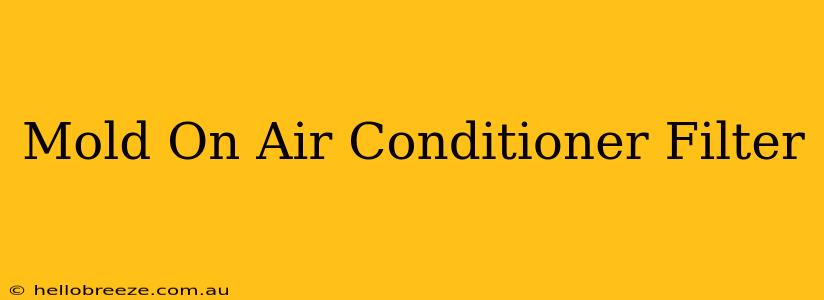Mold growing on your air conditioner filter is a common problem, but it's one you shouldn't ignore. A moldy filter not only affects the air quality in your home, potentially triggering allergies and respiratory problems, but it also reduces the efficiency of your AC unit. This comprehensive guide will delve into the causes of mold growth, effective prevention strategies, and thorough cleaning methods to ensure a healthy and efficient air conditioning system.
Understanding the Mold Problem
Mold thrives in damp, dark environments – conditions often found in air conditioner filters. The filter traps dust, pollen, and other airborne particles, providing a perfect breeding ground for mold spores when moisture is present. Ignoring a moldy filter can lead to several issues:
- Poor air quality: Mold spores released into the air can cause allergies, asthma attacks, and other respiratory problems.
- Reduced AC efficiency: A clogged filter restricts airflow, forcing your AC unit to work harder, potentially leading to higher energy bills and premature wear.
- System damage: Mold can spread to other parts of your AC system, causing damage and expensive repairs.
Common Types of Mold Found on AC Filters
While many types of mold can grow on air conditioner filters, some are more prevalent than others. These often include:
- Cladosporium: A common outdoor mold that can easily enter your home.
- Aspergillus: Another common mold, some species of which can produce toxins harmful to human health.
- Penicillium: Known for its ability to grow on a wide variety of surfaces, including damp AC filters.
It's crucial to remember that identifying the specific mold type often requires laboratory analysis. However, recognizing the signs of mold growth is enough to prompt immediate action.
Preventing Mold Growth on Your Air Conditioner Filter
Prevention is always better than cure. Here are some simple yet effective steps you can take to minimize mold growth on your air conditioner filter:
- Regular filter changes: The most effective prevention is replacing your filter regularly. Consult your AC unit's manual for the recommended frequency, but generally, changing it every 1-3 months is a good guideline.
- Proper humidity control: High humidity levels create an ideal environment for mold growth. Using a dehumidifier, especially during humid seasons, can significantly reduce the risk.
- Proper ventilation: Ensure adequate ventilation in your home to prevent moisture buildup. Use exhaust fans in bathrooms and kitchens.
- Regular AC maintenance: Scheduling professional AC maintenance once a year allows technicians to check for other potential sources of moisture and ensure proper system functioning.
Cleaning a Moldy Air Conditioner Filter
If you discover mold on your filter, don't panic. Cleaning or replacing it is a relatively straightforward process. However, if you have severe mold allergies or respiratory problems, it is best to wear a mask and gloves during cleaning.
For washable filters:
- Remove the filter: Carefully remove the filter from your AC unit.
- Rinse with water: Gently rinse the filter with cool water to remove loose mold and debris. You may use a garden hose for easier cleaning.
- Scrub with mild detergent (optional): For stubborn mold, use a mild detergent and a soft brush to gently scrub the filter. Rinse thoroughly afterward.
- Allow to air dry completely: Ensure the filter is completely dry before reinstalling it to prevent further mold growth. Never put the filter back in while damp!
For disposable filters:
- Simply replace the filter with a new one.
When to Call a Professional
While cleaning a moldy filter is usually manageable, there are instances when professional help is necessary. If:
- Mold infestation is extensive: If the mold growth is widespread or appears to have spread beyond the filter.
- You experience health issues: If you experience worsening allergy symptoms or respiratory problems.
- You are unsure about cleaning: If you're uncomfortable or unsure about cleaning the filter yourself.
Contact a qualified HVAC technician or mold remediation specialist for professional assistance. They can effectively remove mold and identify any underlying issues contributing to its growth.
By understanding the causes of mold growth on air conditioner filters, implementing prevention strategies, and knowing when to seek professional help, you can maintain a healthy and efficient home air conditioning system. Remember, prioritizing air quality is crucial for your family's well-being.

